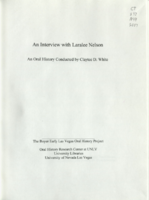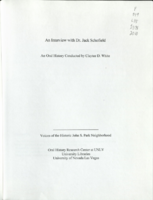Search the Special Collections and Archives Portal
Search Results

Transcript of interview with Clark Crocker by Monica Lehman, March 3, 1978
Date
Archival Collection
Description
On March 3, 1978, Monica Lehman interviewed Clark Crocker (born 1920 in Westfield, Massachusetts) about his experiences while living in Nevada. Crocker first talks about his family and educational background before describing his experiences from going to school in both California and Massachusetts. Crocker then describes what he knows about the building of Hoover Dam and later talks about his career as a teacher and school principal. The two also discuss Crocker’s hobbies and volunteer work, including that for the fire department in Pahrump, and they later discuss Crocker’s experiences as both a frogman and navigator for the United States Navy during World War II. The interview concludes with some of Crocker’s thoughts and philosophies on how curriculum should be structured in schools.
Text

Irene Cepeda interview, April 24, 2019: transcript
Date
Description
Interviewed by Monserrath Hernández, Nathalie Martinez and Rodrigo Vázquez. Irene Cepeda is a woman dedicated to serving the Latinx as well as all minority groups in education in Southern Nevada. As a Las Vegas native, she grew up alongside the Latinx community here and is a proud Latina from Nicaraguan roots. She is dedicated to uplifting the Latinx community through her work with the Latino Youth Leadership Conference and college access specialist at Nevada State College. Now, as representative of District D on the Clark County School District Board of Trustees, she seeks to tackle the issues the district faces from acts of White supremacy to a lack of funding for English Language Learner families.
Text

Transcript of interview with Laralee Nelson by Claytee White, April 20, 2010
Date
Archival Collection
Description
Laralee Nelson and her four sisters were born and raised in Provo, Utah. She was raised in a Mormon household, her parents worked at Brigham Young University and she attended BYU She was .nearly thirty years old when she moved to Las Vegas with her husband. The move was the first real move away from her Utah home base. She fondly recalls summers at an archaeological dig in Israel while studying for her undergraduate degree. But these were nothing compared to relocating to Las Vegas. Laralee's mother was a librarian at BYU and an obvious inspiration to her career choice. Once she arrived in Las Vegas, she applied for a cataloging position at UNLV. From 1982 to 2010, it was her first and only position. From that span of years, she witnessed monumental changes in the library. Changes in leadership, a move from the old Dickinson Library to the new Lied Library, and the impact of technology. Laralee's anecdotes, especially one about the professor with the red wagon and another about her father clearing a rocky path on a family trip, reveal core success of a library built to serve the university community.
Text

Transcript of interview with Harry Kogan by Barbara Tabach, January 12, 2016
Date
Archival Collection
Description
With a liveliness of a man decades younger, Harry Kogan looks at his 100th birthday with cheer and satisfaction. Born March 11, 1916 to poor Russian immigrant parents in the Jewish ghetto of Philadelphia, Harry vividly recalls walking to school shoeless, with no hat or no raincoat. A treat would be his mother handing him ten-cents to go to the theater and enjoy a silent movie. After graduating from high school in 1933, Harry quickly took one of the rare jobs available in a garment manufacturing company where he worked his way into being a skilled and valued fabric cutter-a job that paid $35 a week. Harry was raised with two brothers and lived in Philadelphia for the first 91 years of his life before moving to Las Vegas. One of his brothers learned the refrigeration business while enlisted in the Navy and after the war formed a commercial refrigeration business named Kogan Brothers. Harry is a philosophical and philanthropic man. He was slow to retire and traveled the world, took classes and donated to his favorite causes; among which are the Boys Town Jerusalem and the Jewish Federation of Las Vegas. He sat for this interview to honor his Jewish roots, to share his life experiences and spending the past years in Las Vegas.
Text

Transcript of interview with Laura Sussman and Wendy Kraft by Barbara Tabach, February 17, 2016
Date
Archival Collection
Description
They've been referred to as the two Jewish mothers who own a funeral home. At first glance that seems too simple a description. However, it is how they arrived at this description that tells a story of two women who moved here in the late 1990s and whose paths crossed as they became part of the Jewish community of Las Vegas. Laura Sussman arrived first. It was 1997. The Jewish Community Center, a JCC without walls as Laura puts it, hired her as its first executive director. She was from Ohio where there was a robust Jewish tradition. She was director for eight years; then executive director at Temple Beth Sholom. Wendy Kraft moved to the valley in 1999. She was a stay at home mom from Boston, who was accustom to volunteering in the Jewish community. Knowing no one and on the brink of divorce, the Jewish community became her life, a way to build a network of friends and keep her occupied just as it had been in Boston. The two women met through their work with the JCC and love followed. Several years later, in 2009, so did their new business, Kraft-Sussman Funeral and Cremation services. By February 6, 2015, Laura and Wendy had married. They had already formed a family with each other and their three daughters, Leah Sussman, Emma and Elyse Kraft. In this interview they discuss their joint sense of purpose that includes love of family, dedication to the Jewish community, pride in the LGBT identity, and providing caring services to those at the time of funeral services. They talk also of Jewish traditions related to death, the Jewish burial society known as Chevra Kadisha, and challenges of their industry. They share feelings about nonprofits and how they value being actively involved in the community.
Text

Transcript of interview with David Dahan by Barbara Tabach, May 26, 2016
Date
Archival Collection
Description
The fascinating life of David Dahan began in Casablanca, Morocco where he was born to Mathilde and Isaac Dahan in 1957. After a hasty departure in 1970 the family came to America and to Las Vegas. Isaac became an administrator for Yellow Cab and Mathilde was a server at the Stardust Hotel/Casino. David evokes a tale of growing up a teenager in a strange culture and then heading out on a solo adventure to learn about the world. By 1977, he fell in love and married an engaging Israeli nurse named Yaffa (1954-2007). Her legacy is the Yaffa Dahan Nursing Education Fund established to assist outstanding PhD nursing students in their dissertation research. Leadership and the energy to always say yes are among David?s many characteristics. He has served on numerous local boards, such as: Nevada Restaurant Association, North Vista Hospital, Touro University, Las Ventanas, Henderson Chamber of Commerce, and the Nevada Law Foundation. He has been the recipient of many awards and acknowledgments for his tireless efforts throughout Las Vegas. Among those is being named the 2005 Person of Influence by In Business Las Vegas. From 1997 ? 1999, he served as President of the Jewish Federation during which time he led a trip to Russia. He is past chair of AIPAC (American Israel Public Affairs) Committee. In 2007, David was honored as Mensch of the Year at Congregation Ner Tamid. In this interview he recalls his family?s escape from Morocco, learning to adjust to life in Las Vegas and his early jobs in the restaurant business. With his roots firmly planted in Las Vegas, David has built strong relationships within the Jewish and general Las Vegas communities. David is the Chief Executive Officer of Orgill/Singer Insurance. His life experiences have fueled passions for his faith, cooking, photography, poetry and his daughters, Shana and Michelle.
Text

Transcript of interview with Esther Toporek Finder by Barbara Tabach, June 8, 2016
Date
Archival Collection
Description
Esther Toporek Finder is a professor of psychology and has lived in Las Vegas, Nevada since 2010. She was born May 28, 1953, in Chicago, Illinois, and moved to Washington D.C. in 1979 after graduating with her Masters from the University of Chicago. While in Washington D.C, Finder was able to jump start her career as an oral historian recording Holocaust survivor stories with the U.S Holocaust Memorial Museum and the Shoah Foundation. Esther Finder is a second generation Holocaust survivor. Her passion for Holocaust education and its representation in society has led her to many opportunities to teach, facilitate, educate, create and contribute to many survivor oriented groups such as The Generation After where she was President for 15 years, the Holocaust Era Assets Conference as representation of the American survivor community, as well as the creation of the Generations of the Shoah International group in October 2002. When Finder moved to Las Vegas, she quickly and deeply involved herself in the Las Vegas Holocaust survivor community. She has been integral with Nellis Air Force Base?s Days of Remembrance, the opening the Generations of Shoah Nevada Chapter, and partnering with the World Federation of Jewish Child Survivors of the Holocaust and Descendants to bring conferences to the Las Vegas Valley. In addition, she has been an organizer of commemoration programs for students attending UNLV and schools within the Clark County School District. Her involvement with the Governor?s Advisory Council on Education Relating to the Holocaust and the television series Eyewitness to History have highlighted the Holocaust survivors living in Las Vegas. In this interview, Finder discusses her childhood as well as the paths that led her to realize her passion for the Holocaust survivor community and her deep association with the community. She shares her experiences interviewing survivors and second generation survivors giving a deeper insight into the stories that they have shared with her over the years. In addition, she reflects on her long reach within the survivor community and brings to light the foundation of family being a survivor gives. Finder highlights the traveling, teaching and community service opportunities she has had over the years while enlightening people about the importance of countering hate through education.
Text

Transcript of interview with Dr. Jack Lund Schofield by Suzanne Becker, January 13, 2009
Date
Archival Collection
Description
In the dusty border town of Douglas, Arizona, Dr. Jack Lund Schofield was born in the family home in 1923. Due to the economic woes of the Great Depression, the Schofield family moved several times until 1937—the year that Jack's father took a position as a tungsten broker and moved his family of five children to Nevada. For Jack, who was ready to start high school, the move from Phoenix to Las Vegas with a small population of 5000 was a shock. However, it did not take the gregarious Jack long to make friends at Las Vegas High School. He played sports and was a Golden Glove boxing champion. As Jack's high school years drew to an end, two major events occurred: he met his future wife and World War II began. He proudly highlights his service as a fighter pilot in both WWII and the Korea conflict, his family genealogy, and his devotion to being an excellent educator, businessman, family man, and politician. In 1995, he earned his doctorate in education at the age of 72. His resume includes being an elected official, serving on the Board of Regents and having a middle school named after him. Jack and his wife, Alene, have resided in the John S. Park Neighborhood for over 50 years and describes his affection for the neighborhood and some of the changes that have occurred.
Text

Danny Cluff oral history interview: transcript
Date
Archival Collection
Description
Oral history interview with Danny Cluff conducted by Claytee D. White on December 8, 2017 for the Remembering 1 October Oral History Project. In this interview, Danny Cluff discusses his attendance at the Route 91 Harvest music festival on the evening of the October 1, 2017 mass shooting in Las Vegas, Nevada with his friends and nephew. He talks of finding safety in Hooters with other survivors from the concert. When speaking of gun control, he discusses his perspectives on human nature, citing his experiences during and after the concert shooting. Throughout the interview, Cluff speaks of the ways he has healed and kept positive after the shooting, such as laughing through the hard times and writing poetry, of which he gives a few samples.
Text

Alex de Castroverde oral history interview: transcript
Date
Archival Collection
Description
Oral history interview with Alex de Castroverde conducted by Monserrath Hernandez on April 17, 2019 for the Latinx Voices of Southern Nevada Oral History Project. In this interview, De Castroverde discusses his family's background and his parent's emigration story from Cuba to the United States. He talks about growing up in Reno, Nevada, his father becoming a lawyer, and attending the University of Nevada, Reno. De Castroverde remembers the establishment of De Castroverde Law Group, the significance his father had on the Hispanic community in Las Vegas, Nevada, and taking over operations of the law firm with his brother. Lastly, De Castroverde talks about his involvement with Cristo Rey St. Viator College Preparatory High School, the Guinn Center, and the Las Vegas Business Academy.
Text
